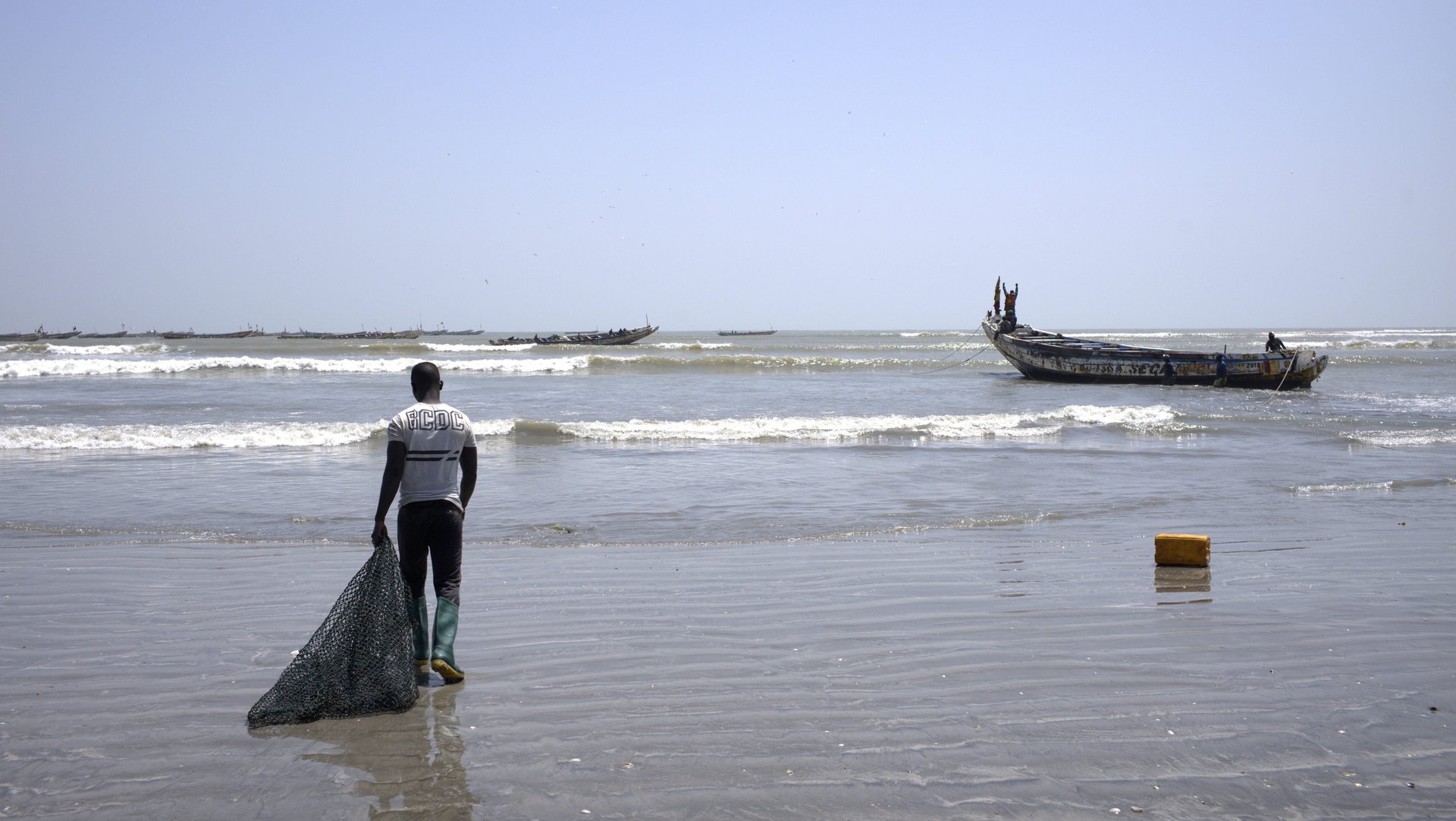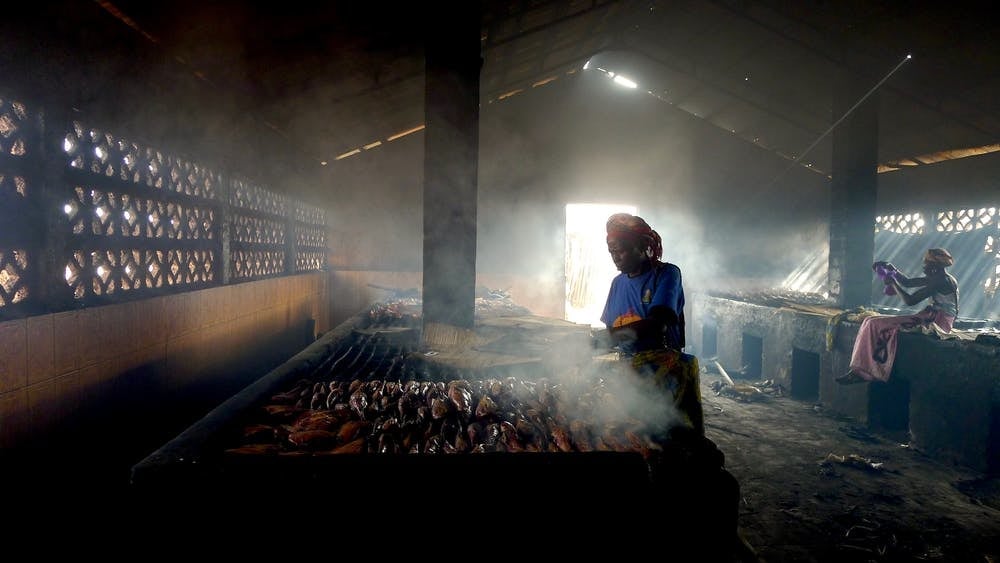Anti-Chinese protests in a Gambian fishing village show conflict of foreign investment in Africa
Gunjur Beach should be a pearl in the crown of the Gambia, a small sliver of a country in West Africa. Long stretches of silver sand are lined with coconut palms, while many generations of fishermen from nearby Senegal have used this beach as a landing point for their colorful and masterfully crafted wooden boats. And in the past 30 years several bars and eco-tourism ventures have moved into the area, serving “voluntourists” and bird watchers.


Gunjur Beach should be a pearl in the crown of the Gambia, a small sliver of a country in West Africa. Long stretches of silver sand are lined with coconut palms, while many generations of fishermen from nearby Senegal have used this beach as a landing point for their colorful and masterfully crafted wooden boats. And in the past 30 years several bars and eco-tourism ventures have moved into the area, serving “voluntourists” and bird watchers.
I have just returned from Gunjur, where I was researching its historical community-based link with the town of Marlborough in the UK. During my visit, I met various members of the community to explore the particular development challenges faced there today.
I heard that, for the past few years, the seafront at Gunjur has been at the centre of a tense environmental and social dispute, one that magnifies wider concerns about the nature of Chinese investment in The Gambia.
The dispute is over a factory that produces fishmeal, a product obtained by drying and grinding fish or fish waste. It is usually sold as powder before being added to other foods and fed to poultry, pigs or farmed fish. In 2016, a Chinese-owned fishmeal manufacturer, Golden Lead, opened a factory and started operations at Gunjur Beach. The factory is flanked by the ocean on one side and on the other the Bolong Fenyo – a lagoon with lots of birds that was Gambia’s first community wildlife reserve.
Golden Lead’s operational contract was issued by the previous government of Yahya Jammeh, an autocrat who was much reviled for reported corruption and human rights abuses. Some locals worried about its environmental impact but, nonetheless, the factory was initially welcomed. Locals believed Golden Lead promised improved infrastructure, increased employment and training for Gambians. With relatively high wages on offer, around 80 people took up jobs.
However tensions soon surfaced over the factory’s use of ocean-caught bonga, a fish that Gunjurians have long relied upon as a cheap and abundant source of protein. Increased pressure on supplies has already pushed up bonga prices.

Local residents allege that since the factory arrived in Gunjur, swathes of dead fish and mammals – including whales, turtles, dolphins, eels and rays – have washed up on the beach. Things started to escalate when, in 2017, the Bolong Fenyo suddenly changed colour and fish and birds in the protected reserve started to die. Biomedical scientist Ahmed Manjang tested the local water and found it was unusually high in phosphates.
Local environmentalists blamed a waste pipe running from the factory building into the ocean (fishmeal factories tend to produce lots of wastewater). However, Golden Lead had previously denied that it had been dumping wastewater products.
The Gambian National Environment Agency (NEA) then got involved, and ordered Golden Lead to treat its wastewater and remove the pipe. However, after months of inaction, local residents and environmental activists gave Golden Lead an ultimatum: move the pipe within seven days or we will. And so, on March 22 2018, that’s exactly what they did. Up to 150 young Gunjurians assembled on the beach, where they were met by a large deployment of police. A group of activists armed with shovels physically dug out and removed the pipe.
In spite of the NEA’s earlier demands, Golden Lead was soon permitted to reinstall a waste pipe. Local news agency, Gunjur News Online said the move was politically motivated, with their sources suggesting that the government stepped in due to concerns about discouraging potential investors. Foreign income is much sought after by the Gambian government, which must contend with a large current account deficit and public debt.
At the end of May 2018, a new pipe was installed with a certain amount of theatricality. Golden Lead this time chose a central spot on Gunjur beach to lay the waste pipe and staff members raised a Chinese flag in the process. This act was perceived as a provocation by members of a community whose entire village was once destroyed during colonial land grabs at the end of the 18th century. As one activist told me:
When they planted a flag on our beach like that, we really saw this as an insult. While we are not against investment in the area, we do ask that these things are undertaken responsibly and that they do not cause harm to our people and environment.
Local activists continue to allege the plant is responsible for pollution and overfishing, but the government says it is satisfied Golden Lead has cleaned up its act. Golden Lead denied to the Guardian in March 2019 that it outcompetes local fish sellers and said it had a zero tolerance approach to pollution. As also reported in the paper, Jojo Huang, the director of the fishmeal plant, has also previously stated that the factory was “in no way responsible for the dumping of fish in the local area” and that it “does not pump chemicals into the sea and has followed guidance from the National Environment Agency on waste management”.
However, community members have now filed court cases seeking reparations for environmental degradation, so the story continues to unfold.

Gunjur is the site of one of three Chinese-owned fishmeal plants that have recently set up operations in the Gambia. The Guardian reports that the other factory sites at Kartong and Sanyang have both faced temporary closures due to complaints and protests linked to waste disposal methods.
Together with the Gunjur site, these three factories provide a glimpse of the tensions between the need to economically develop and attract foreign investment, and local environmental and socio-economic issues. And as someone who researches the politics of resistance in the global south, what is especially encouraging about events in the Gambia to me is that this local activism represents a rebirth of civil society following the demise of the Jammeh regime.
Holly Eva Ryan, Lecturer in Politics & International Political Sociology, Queen Mary University of London
This article is republished from The Conversation under a Creative Commons license. Read the original article.
Sign up to the Quartz Africa Weekly Brief here for news and analysis on African business, tech and innovation in your inbox